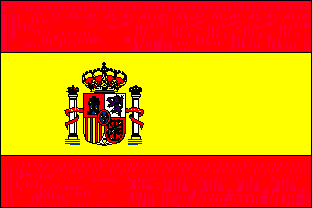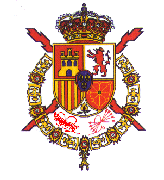|
King Juan Carlos I
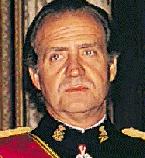 His Majesty was born on January 5th, 1938 in Rome, where the Royal Family was living at that time, having had to leave Spain when the Republic was proclaimed in 1931. His father, Don Juan de Borbon y Battenberg, Count of Barcelona and Head of the Spanish Royal Household ever since King Alfonso XIII had relinquished this status, and his mother, Dona Maria de las Mercedes de Borbon y Orleans. His Majesty was born on January 5th, 1938 in Rome, where the Royal Family was living at that time, having had to leave Spain when the Republic was proclaimed in 1931. His father, Don Juan de Borbon y Battenberg, Count of Barcelona and Head of the Spanish Royal Household ever since King Alfonso XIII had relinquished this status, and his mother, Dona Maria de las Mercedes de Borbon y Orleans.
At the express wish of his father, he was educated in Spain, which he visited for the first time at the age of ten. In 1954 he completed his Baccalaureate at the San Isidro School in Madrid, and in 1955 began his studies at the Academies and Military Colleges of the Army, the Navy and the Air Force. During this time he carried out his practice voyage as a midshipman on the training ship Juan Sebastian Elcano and qualified as a military pilot. In 1960.61 he completed his education at Madrid's Complutense University, where he studied constitutional and international law, economics and taxation.
On May 14th, 1962, he married Princess Sofia of Greece, the eldest daugther of King Paul I and Queen Federika, in Athens. After their honeymoon, the Prince and Princess went to live at the Palacio de la Zarzuela, on the outskirts of Madrid, which is still their residence. In 1963 the first of their three children, Princess Elena, was born, followed, two years later, by Princess Cristina and finally, in 1968, by Prince Felipe.
After his designation as future succesor to the Head of State in 1969, he embarked on a series of official activities, touring Spain and visiting many foreign countries, including France, the Federal Republic of Germany, the United States, Japan, China and India.
On the death of the previous Head of State, Francisco Franco, Juan Carlos was proclaimed King on November 22nd, 1975. In his first message to the nation he expressed the basic ideas of his reign, to restore democracy and become King of all Spaniards, without exception.
The transition to democracy, under the guidance of a new Government, began with the Law on Politicial Reform in 1976. In May 1977, the Count of Barcelona trasnferred to the King his dinasty rights and his position as head of the Spanish Royal Household, at a ceremony which confirmed the fulfilment of the role incumbent on the Crown on the Crown in the restoration of democracy. A month later the first democratic election sice 1936 was held and the new parliament drafted the text of the current Constitution, approved in a referendum on December 6th, 1978.
The Constitution establishes as the form of government of the Spanish State that of a parliamentary monarchy, in which the King is the arbiter and overseer of the proper working of the institutions. By giving the royal assent to this Constitution, King Juan Carlos expressly proclaimed his firm intention to abide by it and serve it. In fact, it was the actions of the Monarch that saved the Constitution and democracy during the night of February 23rd. 1981, when the constitutional powers had been retained in the Parliament building in an attempted coup.
In the course of 25 years the King has toured Europe, Latin America, the United States and Canada, the Arab countries, Israel, China, Japan, Indonesia, Australia, New Zealand and many countries in black Africa. He has also addressed many international organizations: the United Nations, the institutions of the European Union, the Council of Europe, the Organization of American States, UNESCO, the International Labour Organization and the Arab League.
The King has encouraged a new style in conducting relations with Latin America, emphasizing the identifying features of a cultural community based on a common language, and pointing out the need to generate common initiatives and take part in suitable kinds of cooperative activity. The countries of that area have shown great generosity in agreeing on the need to create a permanent framework capable of expressing this new situation, setting objectives and organizing programmes and specific lines of action. This is the rationale behind the Latin American Conferences, the first of which was held in Guadalajara, Mexico, in 1991.
As a convinced European, and a winner of the Charlemagne Award in 1982, Juan Carlos delivers insistent reminders of Spain s European calling throughout its history. The importance of the European union in the contemporary world and in particular in the areas which are most akin to it, including Latin America, has been stressed by the King in many messages.
Queen Sofía
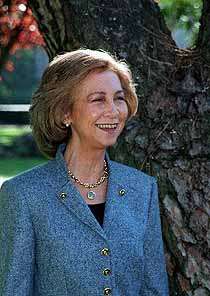 Her Majesty was born in Athens on November 2nd, 1938. She was the first born daugther of the King and Queen of Greece, Paul I and Federika. Her family belongs to one of the oldest Royal Houses in Europe and is related to the Czars of Russia, the German Emperors and Queen Victoria of Great Britain. Her Majesty was born in Athens on November 2nd, 1938. She was the first born daugther of the King and Queen of Greece, Paul I and Federika. Her family belongs to one of the oldest Royal Houses in Europe and is related to the Czars of Russia, the German Emperors and Queen Victoria of Great Britain.
She spent part of her childhood in Egypt and South Africa, as her family was obliged to go into exile during the Second World War. She returned to her country in 1946, completed her education at the prestigious German boarding school of Schloss Salem, and, having returned to Athens, specialized in paediatrics, music and archaelogy. She took part as a reserve for the Greek sailing team in the 1960 Olympic Games in Rome.
On May 14th 1962 she married Prince Juan Carlos de Borbon y Borbon, and in subsequent years her three children were born: Infanta Elena on December 20th, 1963, Infanta Cristina on June 13th, 1965, and Prince Felipe on January 30th, 1968.
In addition to taking part in institutional events, the Queen devotes a great deal of attention to social and charity activities. She is the executive president of the Queen Sofia Foundation, which in 1993 has sent the major part of its funds to help Bosnia, and honorary president of the Royal Board on Education and Care of Handicapped Persons, and the Foundation for Aid for Drug Addicts. She takes special interest in this latter problem, taking part personally in conferences and meetings on the subject both in Spain and abroad.
Her help for the underprivileged is not confined to resolving specific situations, but also extends to progress in the field of research and to encouraging initiatives and cooperation agreements designed to prevent them from arising or to palliate their effects.
With regards to culture, Queen Sofia's fondness for music is well known. The Queen is an honorary member of the San Fernando Academy of Fine Arts, and holds an honorary doctorate from the University of Valladolid and, together with the King, from Cambridge.
Crown Prince Felipe of Asturias
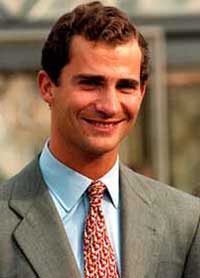 Prince Felipe de Borbon y Grecia, the third child of King Juan Carlos and Queen Sofia, was born in Madrid on January 30th, 1968. Prince Felipe de Borbon y Grecia, the third child of King Juan Carlos and Queen Sofia, was born in Madrid on January 30th, 1968.
His birth, which ensured the male succesion to the Crown was a dynastic event whose importance was emphasized in the symbolic names he was given at his shristening of Felipe, Juan, Pablo and Alfonso de Todos los Santos, the names of the first Bourbon to reign in Spain, his paternal and maternal grandfathers, the Count of Barcelona and King Paul of the Hellenes, and his great grandfather King Alfonso XIII, and in the fact that his godparents were the head of the Spanish Royal Hosehold and Queen Victoria Eugenia, who set foot on Spanish soil for this purpose for the first time since 1931.
He began his education at Santa Maria de los Rosales school, a modern institution where he could fit in without any special distinctions, where he remained until 1984.
Heir to the Throne since the proclamation of his father as King, 1975, in 1977 he received the title of prince of Asturias, together with those of Prince of Girona and Viana, the titles vested in the first born of the Kingdoms of Castile, Aragon and Navarre, the union of which in the 15th century gave rise to the Spanish Monarchy.
Having completed his secondary studies, he did a year s preparation for university at Lakefield College School in Canada, and then began his military training at Academies and Colleges of the three services for a period of three years.
In 1987 he did his practice voyage as a midshipman on the Navy training ship the Juan Sebastian Elcano, during which he was received by the Presidents of Argentina, Brazil, the United States, the Dominican Republic and Uruguay.
On January 30th, 1986, at the age of eighteen, he took the oath of loyalty in the Cortes to the Constitution and the King, thus taking on his full institutional role as heir to the Throne.
From 1987 to 1993 he studied at Madrid's Autonomous University,, where he took his degree in law, and also attended courses on economics. At the present time he is doing a master s course on international relations at the University of Georgetown, in Washington.
In the last few years he has made several official visits to European countries and Latin America, as well as Australia, New Zealand and Morocco.
He is honorary president of the Spanish Section of the Association of European Journalists, the Autonomous University Foundation and the Prince of Asturias Foundation, where each year he presents the prestigious international prizes bear his name.
He takes part in several sports, such as skiing, motocross and, especially, sailing. He was a member of the Olympic sailing team in the Barcelona Games in 1992, and took part in the opening ceremony as the Spanish team' s standard bearer.
On the 1 November 2003, Their Majesties the King and Queen announced the engagement of their son and heir apparent, H.R.H. The Prince of Asturias, to Letizia Ortiz Rocasolano, solemnised at the Cathedral of Madrid, on the 22 May 2004.
Princess Letizia
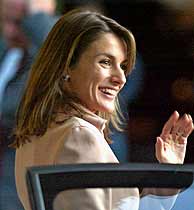 The Princess of Asturias, Letizia Ortiz Rocasolano, was born on 15th September 1972, at Oviedo to a family with close ties to the mass media. She has two sisters, and contracted civil marriage in 1999, which was dissolved a year later. The Princess of Asturias, Letizia Ortiz Rocasolano, was born on 15th September 1972, at Oviedo to a family with close ties to the mass media. She has two sisters, and contracted civil marriage in 1999, which was dissolved a year later.
She holds a Bachelor’s Degree in Journalism from the Complutense University of Madrid, as well as a Master’s Degree in Audiovisual Journalism from the Institute for Studies in Audiovisual Journalism. She started her PhD in Mexico, where she worked at the Siglo 21 newspaper.
She has worked from a very young age in several media, among them the Asturian newspaper La Nueva España, ABC newspaper and the EFE Agency, where she worked in international editing during her last year at University.
As for television, she has worked at the U.S. Bloomberg TV channel, a private channel specialising in economy, finance and the markets, with a branch in Spain under the supervision of the EFE Television Agency. She has also been a newscaster, an editor and a reporter at CNN plus, the private channel formed by CNN and CANAL Plus.
In 2000, Letizia Ortiz commenced working at Televisión Española (Spanish Television), where she belonged to the editing team of the news programme Telediario (News broadcast), Segunda Edición (Evening Edition) and was in charge of presenting Informe Semanal. Subsequently, she anchored Telediario Matinal, the special programmes on the EURO offered by TVE’s news programmes, and she has been a correspondent covering current events in different locations all over the world. After that, she rejoined the editing team of Telediario Segunda Edición, which she co-anchored. She received the “Larra” Award, awarded by the Madrid Press Association to the most distinguished journalist of the year under 30.
Princess Letizia of Spain is pregnant and expecting to give birth in November to
a baby that could become the second in line to the Spanish thrown.
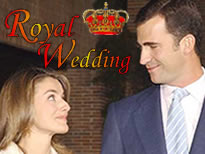
Duchess and Duke of Lugo
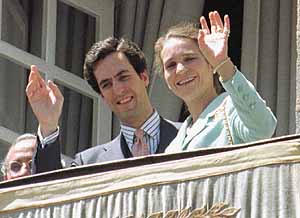 Infanta Elena Maria, Isabel, Dominica de Silos de Borbon y Grecia is the eldest daughter of the King and Queen of Spain, Juan Carlos and Sofia. At the present time she is the second in line for the succession to the Crown, after her brother the Prince of Asturias. Infanta Elena Maria, Isabel, Dominica de Silos de Borbon y Grecia is the eldest daughter of the King and Queen of Spain, Juan Carlos and Sofia. At the present time she is the second in line for the succession to the Crown, after her brother the Prince of Asturias.
She was born in Madrid on December 20th, 1963. On the 27th of the same month, she was christened in the Palacio de la Zarzuela by the Papal Nuncio. Her godparents were her paternal grandmother, Maria de las Mercedes de Borbon y Orleans, the Countess of Barcelona, and His Royal Highness Alfonso de Orleans y Borbon.
She completed her secondary education at Santa Maria del Camino School, and then qualified as a schoolteacher at the ESCUNI University College, which is part of Madrid's Complutense University. In 1986 she qualified as a primary school teacher, specializing in English language.
Having completed this stage of her education, she worked as an English teacher at Santa Maria del Camino School, and pursued further study by doing a specialist course in sociology and education at the University of Exeter, in Great Britain.
Subsequently, she completed her education at the University of Comillas, in Madrid, where she graduated in education in June 1993.
In addition to her institutional activities as a member of the Royal Family, she supports and takes part personally in many activities of an educational, cultural and sporting nature. She is honorary president of the Spanish Peadiatrics Society, and of Special Olympics Spain, which promotes the participation of the mentally handicapped in sports activities, and of the Spanish Anti-AIDS Foundation.
She is married with Jaime de Marichalar and is mother of two children: Froilán and Victoria
.
Duchess and Duke of Palma de Mallorca
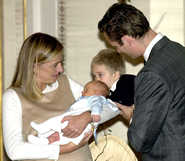 Infanta Cristina, Federica de Borbon y Grecia is the younger daughter of the king and Queen of Spain, Juan Carlos and Sofia, and holds third place in the line of succession to the throne, after Prince of Asturias and Princess Elena. Infanta Cristina, Federica de Borbon y Grecia is the younger daughter of the king and Queen of Spain, Juan Carlos and Sofia, and holds third place in the line of succession to the throne, after Prince of Asturias and Princess Elena.
She was born in Madrid on June 13th, 1965, and was christened at the Palacio de la Zarzuela by the Archbishop of Madrid. Her godparents were Don Alfonso de Borbon, the Duke of Cadiz, and her Royal Highness Cristina de Borbon y Battemberg.
She was educated at the Santa Maria del Camino School, and from 1984 began to study for a degree in politics at Madrid's Complutense University, where she graduated in 1989.
In 1990 she obtained a master's degree in international relations at the University of New York. A year later she did a short course at the UNESCO in Paris. On her return to Spain she kept up her links with this international organization through its Spanish Committee, taking part in a number of projects carried out in collaboration with Spanish bodies and institutions, paying special attention to UNESCO activities in Latin America.
At the present time, she has started out on a period of co-operation in the social and cultural activities of the Caixa Foundation, in Barcelona, the city where she now lives.
Ever since she came of age she has been performing institutional activities as a memeber of the Royal Family, accompanying the Prince and Princess of Wales during their official visit to Spain in 1987, attending the ceremony for the presentation of the Nobel Prize to Camilo Jose Cela in 1989, and presenting the Gold Medal of the Spanish Institute to the Secretary General of the United Nations in 1990.
As from 1989 she visited a number of European and Latin American countries to preside at the opening ceremonies or take part in activities of a mainly cultural nature involving Spain. She is honorary chairperson of the Spanish Committee of UNESCO, and of the Infanta Cristina Foundation for the Physically and Mentally Handicapped, and takes part personally in sailing courses adapted to handicapped persons.
She takes part in several sports, including skiing and, above all, sailing, and has participated in a number of national and international events. She was a member of the Olympic sailing team in the Seoul Games in 1988, where she was the standard bearer for the Spanish team in the opening parade.
She is married with Iñaki Urdangarin and is mother of Juan Valentín, Pablo Nicolás and Miguel.
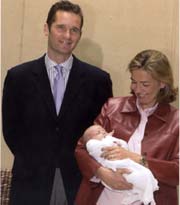 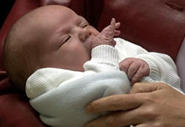
On April 30, 2002, on the 7.30 hours of the morning, the Infanta Cristina gave birth in Barcelona her third son, Miguel, who has weighed when 3 kg. 950 grams (8,7 pounds) and he has measured 52 cm. The mother and the son are in mint condition of health.
The newborn child occupies the eighth place in the Succession to the Crown and is the fifth grandson of the Kings. They will be godfathers in the Baptism the Prince Felipe and Mrs. Lucía Urdangarín.
Infanta Cristina has given birth to a girl on June 5, 2005.
Succession to The Crown
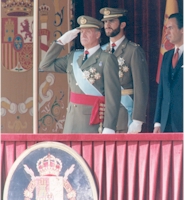 |
The Constitution establishes as the form of government of the Spanish State that of a parliamentary monarchy, in which the King is the arbiter and overseer of the proper working of the institutions. By giving the royal assent to this Constitution, King Juan Carlos expressly proclaimed his firm intention to abide by it and serve it. In fact, it was the actions of the Monarch that saved the Constitution and democracy during the night of February 23rd. 1981, when the constitutional powers had been retained in the Parliament building in an attempted coup. |
Succession to The Crown:
Prince Felipe
Leonor
Infanta Elena
Felipe Juan Froilán
Victoria Federica
Infanta Cristina
Juan Valentín
Pablo Nicolás
Miguel
Irene
Infante Don Carlos, Duque de Calabria
Spanish Monarchy
Spanish reports
Portrait Galery

|
